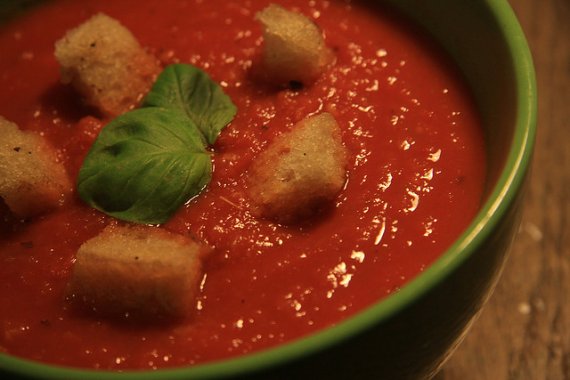Test subjects had less appetite for tomato soup after smelling banana sweets. (photo: Madzia Bryll)
The smell of sweetness stimulates the appetite for sweets and at the same time, puts a stop to that for savouries. And vice versa. This conclusion was reached by Wageningen nutrition researchers after an experiment carried out on test subjects in scented rooms. Their result confirms that smells influence what we want to eat in subtle ways. The research findings recently appeared in The International Journal of Obesity. The researchers also discovered that food smells continued to raise appetites even after test subjects had been exposed to a smell for as long as 18 minutes. This sounds logical, but not much research has been done and the results are conflicting. ‘It is clear that smells increase the appetite in the short term,’ says Mariëlla Ramaekers, a PhD student with Food Quality and Design. ‘You smell French fries and you want to eat them.’ But a British experiment suggested that this effect is eventually reversed. Test subjects who were given a certain food to smell for a long period ended up liking that food less than before. Raemakers thinks that her results are different because she had a different setup. In the Wageningen experiment, 21 participants sat in scented ‘mood rooms’ and they were not asked to focus on the smells. The British experiment had a less realistic exposure to the smell: 12 participants were given a little jar of mashed bananas to smell intensively. ‘In addition,’ she says, ‘our questions concerned their appetite, whereas the British researchers wanted to know how “pleasant” the subjects found a smell.’
Obesity
Nutrition researchers are curious about the signals that can put a stop to your appetite without you actually eating. An example is chewing on food without swallowing it. A ‘brake’ like this can help to reduce overeating and obesity. Ramaekers observed that smells can work in this way for foods outside their own ‘smell category’. Test subjects had less appetite for tomato soup after smelling banana sweets. But none of the food smells could lessen the appetite as a whole.
Ramaekers wonders if her experiment would produce the same results in people who are overweight or obese. ‘There is evidence to suggest that they react differently to food signals.’ Further research would make it clearer how smells – together with other environmental stimuli – can determine what we eat. ‘This,’ says Ramaekers, ‘is one piece of the puzzle.’

